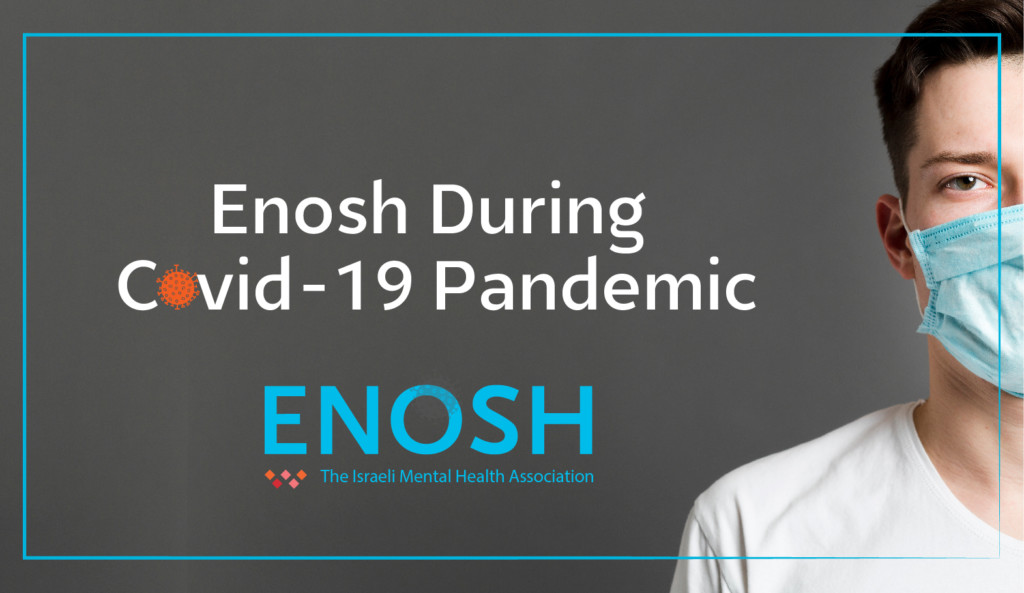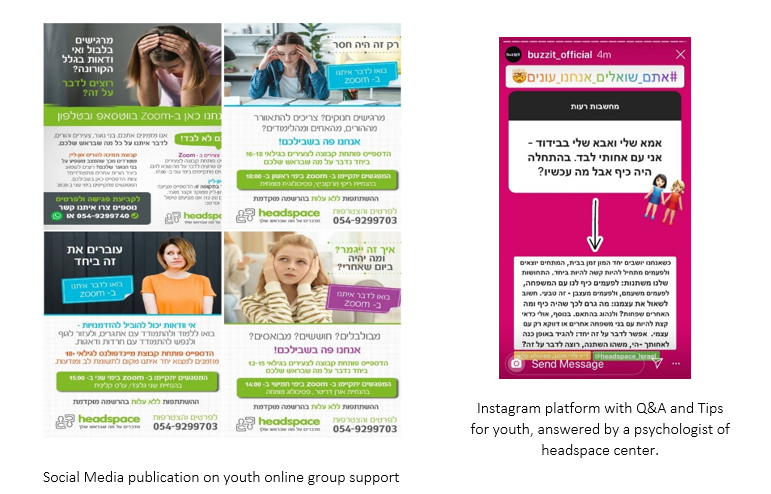Enosh – The Israeli Mental
Health Association respond to the COVID-19 outbreak
In times of crisis, it is more crucial to share knowledge and success stories in the field of community based mental health services responding to COVID-19. The following review will present how Enosh has addressed the emergency situation of COVID-19 in Israel.
Please consider donating to our programs through this link
Enosh – the Israeli mental health Association is the largest community based mental health organization in Israel. Enosh is providing community rehabilitation services to support the social inclusion and rights of people with a psychosocial disability and their families. Our goal is assisting people towards reaching an optimal level of independence within their community, following their changing needs. Enosh operates 70 centers nationwide, providing services for 6,700 individuals and 16,000 family members. Enosh team includes more than 900 professional employees and hundreds of volunteers providing vital services to our consumers in areas of supportive housing, supportive employment, social centers, family counseling centers, as well as youth counseling centers for early intervention.
COVID-19 outbreak and its impact on Enosh service consumers and care professionals
Symptoms of anxiety and depression may increase with the required physical distancing practices. Individuals who are already struggling with their mental health are at higher risk of experiencing worsening symptoms of anxiety and depression. As one of the most vulnerable and financially distressed populations in society, people coping with psychosocial disabilities need our solidarity along with professional and financial support, now more than ever.
The outbreak of Coronavirus pandemic (COVID-19) has interfered with routine, social interaction, and the rehabilitation process of Enosh’s service consumers. Adults with severe mental health conditions, youth that struggle with mental health issues and families that are now being isolated from their loved ones. It is also impacting our professional teams and peer support programs.
Nationwide, we have adjusted our community mental health rehabilitation services to the COVID-19 pandemic crisis and its circumstances, during the past month. We were transforming most of our programs, so they will now be in line with the new physical distancing guidelines. Whether it is online or remote communication, face to face according to the guidelines where we are needed. We added two mental health hotlines to provide support and information to the public, families, and youth in addition to the information line we usually operate.
Our teams are working tirelessly to provide support to all of our clients. This consists of more than 6,000 people with a psychosocial disability that are in quarantine or under lockdown. This situation obviously accelerates anxiety and depression. The past few weeks showed us that everything is possible!
How are we dealing with the challenges? (innovative programs, changes in the delivery of service)
As a response to the new circumstances, Enosh has adjusted its mental health rehabilitation services to the changing reality according to the guidelines and regulations of the Israeli Ministry of Health. In order to continue and provide essential services to people coping with psychosocial disabilities, Enosh was and still is facing unpredicted professional and organizational changes and challenges. Our adjusted services demand us to collect critical information and resources for our service consumers – one of the most vulnerable and financially distressed populations in society. In the past month, we have created many changes in our services to adapt to the new emergency routine:
- We executed our Emergency Resiliency Program and Guidelines –
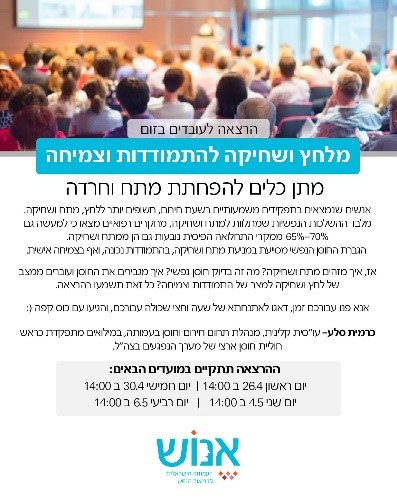
helping our teams to cope with the latest emergency routine and be there for our clients. We have a manager of resiliency and emergency that is supported by local “resiliency referents” in different centers. An organizational survey we conducted showed that employees feel meaningful in this time, in part, due to new working structures we adopted to this crisis (such as opening and closing day calls; organizational guidelines). We are continuing to address the issue to all staff through a series of ZOOM lectures “From pressure and burnout to resiliency and growth”. All materials are uploaded to the Knowledge management system (Enosh DNA) and are accessible to all employees.
- We have created new work programs for our main recovery services in the community:
- Supportive housing programs
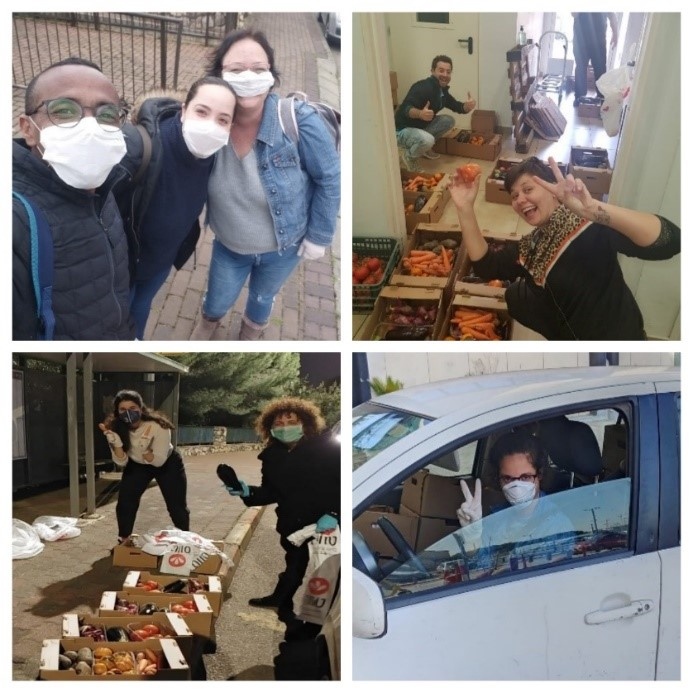
that offer services to more than 2,500 people.
Housing programs are still operating with modifications, and we are working around the clock to ensure hygiene and sanitation equipment, food and medicines, and emotional support are provided. We are providing recovery services and case management, with technological adaptations to support remotely and, in some cases, face to face according to the updated regulations. We have received a donation of smartphones from one of the largest mobile companies in Israel to support our new remote care.
- Social centers – we developed and modified our social centers to an online platform- opening YouTube channel and advancing the Facebook page with recreational and social content (such as lectures, museums tours, wellness and sport lessons, virtual tours around the world, etc.) acquisition of knowledge, feeling of belonging, healthy lifestyle, and learning social skills. We are providing a variety of activities to different clients with mental health issues, working on their recovery plan through social events. All with case management and check-ins with the clients according to their needs.
- Family support centers – we continue to provide support and counseling, one on one and groups with an online platform. We opened new groups that are now much more accessible to people in the peripheral areas of Israel. We were able to provide telephone or video counseling and to open new methods of work (such as parent and sibling together, group support in holidays). We continue to provide information and lectures through the designated Facebook page for families and other media platforms.
- Youth headspace centers. headspace is a proven youth mental health model, established to create youth-friendly centers catering to the mental and emotional health needs of young people aged 12-25 by providing a multidisciplinary enhanced primary care structure or ‘one-stop-shop’ model. We continue to provide services through online and telephone platforms. Our teams work from home or in office according to the health authorities’ guidelines. headspace teams are opening a variety of online groups to parents and youth in different age groups and diversity of cultures and languages. Dr. Valery Hazanov, Director of the Jerusalem Center, published an article in Psychology Today, “Running a Psychology Center in the Time of Corona,” and was talking in the news channel, addressing the issue. The headspace team had also published a video “Say no to violence” to raise awareness against child abuse in this link [Hebrew].
- Support lines – In non-emergency times, Enosh operates information lines for people who want to understand how to navigate the mental health system. At this time of crisis, we opened two additional designated lines: one for people with a psychosocial disability and their family members, and the other is for youth (age 12-25) that are facing a mental health crisis.
- We are modifying our lived experience department work in a nationwide peer-to-peer program (also supported through UPSIDES). The COVID-19 changed our research plans, and we transformed it into an online video platform which creates spaces for peer to peer support groups which are called “together.” We are training Enosh employees with lived experience to lead these peer groups from all around Israel.
- We are continuing to advocate and shape policies in a time of emergency locally through cross-sector round tables, participation in parliamentary discussions, and legal cases and globally through our advocacy partners around the world.
- Support for Employees and services teams: supervision, ongoing guidelines in the internal knowledge management platform; daily meetings at the beginning of the day; flexibility in schedules.
We do much more every day. We are in this together
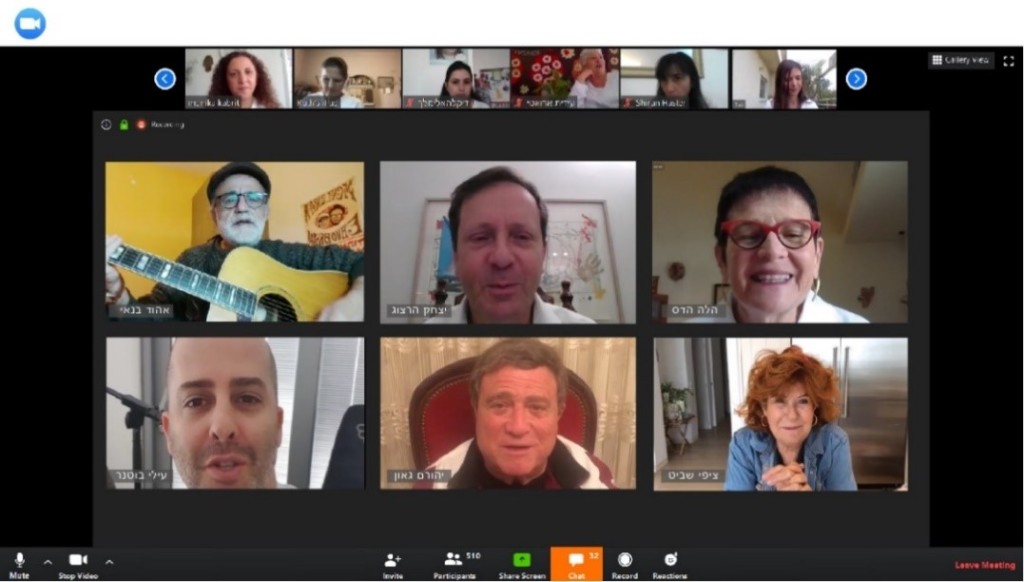
We got together, more than 800 employees, for a Passover Zoom gathering for Enosh staff across the country, with greetings from different Israeli artists and musicians.
Enosh COVID-19 Activity, modification & Impact >
Personal stories
Lion Gai-Meir, Manager of lived experience knowledge, Enosh – The Israeli Mental Health Association Peer support group trainer, UPSIDES, sharing her thoughts on our peer support programs:
“Recently the Coronavirus took almost everything from us. Almost every hold in the ground and every anchor we have in life. It has an effect on each and every person who is close to us, who we love. There is not one piece that hasn’t been shaken from this virus – which like mental health pain, is transparent, you cannot see it, and it doesn’t leave anything as it was before.
Anxiety became a common word in Israel’s public discourse. Isolation and loneliness became, as well, a common experience for many. But there is one thing, powerful thing that enable us to go through these deep abysses. It’s the power of togetherness. Togetherness in common destiny like the destiny of a painful soul.
The Coronavirus also cut the plans for us in developing our lived experience department. In essence, we were developing and promoting new programs (such as research with UPSIDES). We were changing not only our life plans but also our professional plans and decided to develop our new “together” program. It is a peer group model, which will be led by employees of Enosh with lived experience in mental health that are also working on their recovery. Their power will be in building resilience through “togetherness.” This is the origin of the name we picked for this program. Together we have more knowledge from our experience.
I am honored to take part in organizational progress. I am supported by a leading team at Enosh that placed the foundation to create a peer support program in the organization. I am passionate about giving our knowledge that we gained from so many experiences of people to others, organizations, people, and societies. Involvement of people who walked through the “CORONA” way long before it was the world experience. I hope we can all feel more together. “
——————————————————————————————————————————-
Zeev Krauthammer, a volunteer, coping with psychosocial disability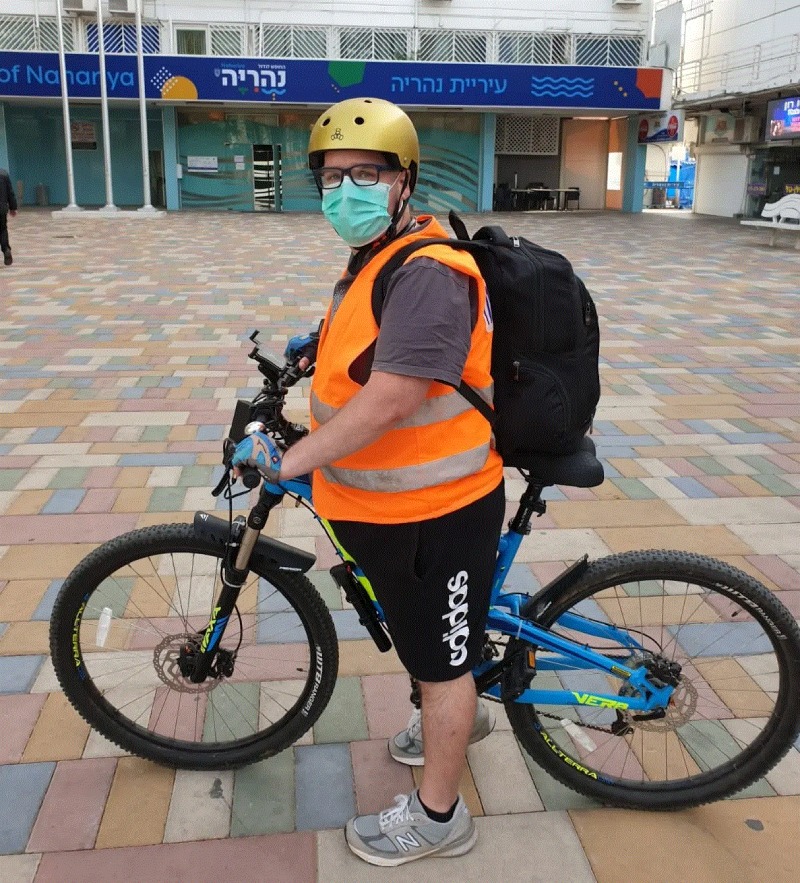
Zeev, 35, is living in the city of Naharia, and he volunteers in the city volunteer department. He is coping with psychosocial disability, and he is a participant in Enosh mental health rehabilitation services. He agreed to be exposed to tackle the stigma associated with mental health and the shame barrier.
He is known in the city riding on his bikes with a mask, helping with providing medication and food to people.
Why with a bicycle?
I do not own a car, but it is no reason not to volunteer. I have bikes, I get calls from the city hotline, and I am providing people with my phone number if they need me. I also volunteered a couple of months ago while we had a big flood in the city.
Zeev was working in a sports club in Naharia, and since the Coronavirus outbreak, he is on unpaid leave.
“My way to cope with the situation is to volunteer and go out. I prefer to donate my time and energy and act to the public good. These are the values I gained in my family that my parents had instilled in me.”
